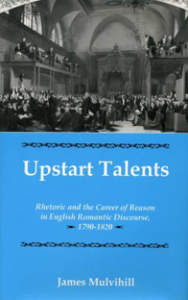
This book examines the use and abuse of rhetoric in English public life from 1790 to the end of the Regency. With chapters focusing on the rhetorical conditioning of rational argument in the public life of Romantic England, it begins with the premise that the rhetoric of this period employs reasoned arguments while also exhibiting regressive tendencies, not so much supplanting rational discourse as using it in unexpected ways. While revisionist treatments of the “public sphere” have succeeded in breaking the concept down into diverse cultural constituencies, this study examines rhetorical assumptions about public discourse common to these constituencies, thus cutting across the left/right poles dominating our ideas about Romantic discourse.
About the Author
James Mulvihill teaches at the University of Alberta.
